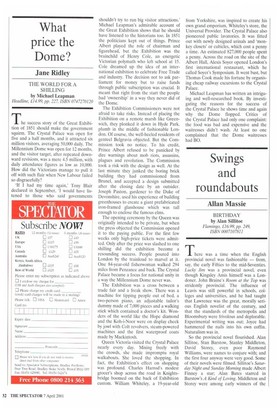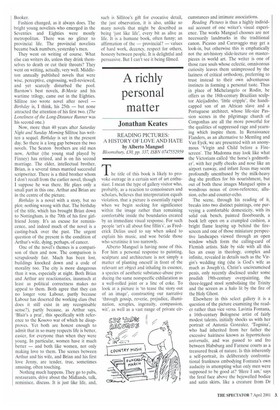Swings and roundabouts
Allan Massie
BIRTHDAY by Alan Sillitoe Flamingo, 116.99, pp. 249, ISBN 0007107811 There was a time when the English provincial novel was fashionable — from, say, the early Fifties to the mid-Seventies. Lucky Jim was a provincial novel, even though Kingsley Amis himself was a Londoner. John Braine's Room at the Top was stridently provincial. The influence of Leavis was still powerful in schools, colleges and universities, and he had taught that Lawrence was the great, morally serious English novelist of the century, and that the standards of the metropolis and Bloomsbury were frivolous and deplorable. Experimental writing was out; Joyce had hammered the nails into his own coffin. Naturalism was in.
So the provincial novel flourished. Alan Sillitoe, Stan Barstow, Stanley Middleton, David Storey, even poor Raymond Williams, were names to conjure with; and the first four anyway were very good. Some of their novels were filmed. Sillitoe's Saturday Night and Sunday Morning made Albert Finney a star; Alan Bates starred in Barstow's A Kind of Loving. Middleton and Storey were among early winners of the
Booker.
Fashion changed, as it always does. The bright young novelists who emerged in the Seventies and Eighties were mostly metropolitan. There was no glitter to provincial life. The provincial novelists became back numbers, yesterday's men.
They went on writing of course. What else can writers do, unless they drink themselves to death or cut their throats? They went on writing, actually, very well. Middleton annually published novels that were wise, perceptive, engrossing, well-reviewed, and yet scarcely disturbed the pool. Barstow's best novels, B-Movie and his wartime trilogy, came out in the Eighties. Sillitoe too wrote novel after novel — Birthday is, I think, his 25th — but none attracted the attention of his first two. (The Loneliness of the Long-Distance Runner was his second one.) Now, more than 40 years after Saturday Night and Sunday Morning Sillitoe has written a sequel. Birthday is set in the present day. So there is a long gap between the two novels, The Seaton brothers are old men now, Arthur (the young stud played by Finney) has retired, and is on his second marriage. The elder, intellectual brother, Brian, is a several times married successful scriptwriter. There is a third brother whom I don't recall from the earlier novel, though I suppose he was there. He plays only a small part in this one. Arthur and Brian are in the centre of the picture.
Birthday is a novel with a story, but no plot; nothing wrong with that. The birthday of the title, which has brought Brian down to Nottingham, is the 70th of his first girlfriend Jenny. It's an excuse for reminiscence, and indeed much of the novel is a casting-back over the past. The urgent question of the present is the condition of Arthur's wife, dying, perhaps, of cancer.
One of the novel's themes is a comparison of then and now. The comparison is scrupulously fair. Much has been lost, buildings knocked down and a code of morality too, The city is more dangerous than it was, especially at night. Both Brian and Arthur are reactionaries, inasmuch at least as political correctness makes no appeal to them. Both agree that they can no longer vote Labour, partly because Labour has deserted the working class (but does it still exist in any recognisable sense?), partly because, as Arthur says, 'Blair's a prat', this specifically with reference to the Kosovo war of which he disapproves. Yet both are honest enough to admit that in so many respects life is better, easier, for everyone than when they were young. In particular, women have it much better — and both like women, not only making love to them. The scenes between Arthur and his wife, and Brian and his first love Jenny, are tender, true, sometimes amusing, often touching.
Nothing much happens. They go to pubs, restaurants, drive about the Midlands, talk, reminisce, discuss. It is just like life, and, such is Sillitoe's gift for evocative detail, the just observation, it is also, unlike so many novels that might be described as being 'just like life', every bit as alive as life. It is a humane book, often funny; an affirmation of the — provincial? — values of hard work, decency, respect for others, honesty between people. It is delightful and persuasive. But I can't see it being filmed.



























































 Previous page
Previous page